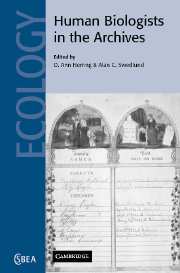 Human Biologists in the Archives
Human Biologists in the Archives Published online by Cambridge University Press: 12 August 2009
Introduction
It was perhaps no exaggeration that nineteenth century Gibraltarians achieved the dubious distinction of being ‘a population, filthy in themselves, and overcrowded, perhaps, beyond any community in the world’ (Hennen 1830: 71). As was the case in many other urban centers of westernized countries, the inhabitants of Gibraltar faced insults from their poor environmental situation and, all too frequently, their daily exposure to infectious diseases. Not surprisingly, poor health and low survivorship were normal by-products of life for all but the very privileged in these urban deathtraps. For Gibraltar, the 1860s captures this dynamic and has been selected here to examine the forces and factors that affected health under a variety of environmentally influenced stressors.
Numerous factors operated to create unhealthy conditions in Gibraltar. Population growth was a particular problem as it had occurred at such an unprecedented rate within an infrastructure that was woefully inadequate to meet its demands. Housing was in limited supply and was further aggravated by the fact that landowners were more concerned with making large and quick profits than with providing proper accommodation for the poor working classes. Aside from the burdens of a growing local population, Gibraltar was also host to a number of itinerant laborers, immigrants, and visitors. As a strategically located free port, Gibraltar proved to be an important node in a trade network linking numerous urban centers throughout Europe, the Mediterranean, Africa and the New World.
To save this book to your Kindle, first ensure [email protected] is added to your Approved Personal Document E-mail List under your Personal Document Settings on the Manage Your Content and Devices page of your Amazon account. Then enter the ‘name’ part of your Kindle email address below. Find out more about saving to your Kindle.
Note you can select to save to either the @free.kindle.com or @kindle.com variations. ‘@free.kindle.com’ emails are free but can only be saved to your device when it is connected to wi-fi. ‘@kindle.com’ emails can be delivered even when you are not connected to wi-fi, but note that service fees apply.
Find out more about the Kindle Personal Document Service.
To save content items to your account, please confirm that you agree to abide by our usage policies. If this is the first time you use this feature, you will be asked to authorise Cambridge Core to connect with your account. Find out more about saving content to Dropbox.
To save content items to your account, please confirm that you agree to abide by our usage policies. If this is the first time you use this feature, you will be asked to authorise Cambridge Core to connect with your account. Find out more about saving content to Google Drive.